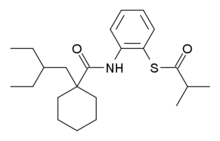CETP inhibitor
A CETP inhibitor is a member of a class of drugs that inhibit cholesterylester transfer protein (CETP).[1][2][3][4] They are intended to reduce the risk of atherosclerosis (a cardiovascular disease) by improving blood lipid levels. Drugs in this class substantially increase HDL ("good cholesterol"), lower LDL ("bad cholesterol"), and reverse the transport of cholesterol. As of 2015, these drugs have generally failed in clinical trials, either causing a marked increase in deaths (torcetrapib), or having no meaningful clinical improvement despite HDL increases (dalcetrapib, evacetrapib).
In clinical trials:
- Anacetrapib, encouraging Phase IIb interim results in 2010. Two phase III trials are running until 2017.
- TA-8995, Phase II results reported in 2015.[5]
Failed:
- Torcetrapib, failed in 2006 due to excess deaths in Phase III clinical trials.
- Dalcetrapib, development halted in May 2012 when Phase III trials failed to show clinically meaningful efficacy.[6]
- Evacetrapib, development discontinued in 2015 due to insufficient efficacy.[7]
Mechanism
CETP inhibitors inhibit cholesterylester transfer protein (CETP), which normally transfers cholesterol from HDL cholesterol to very low density or low density lipoproteins (VLDL or LDL). Inhibition of this process results in higher HDL levels and reduces LDL levels. CETP inhibitors do not reduce rates of mortality, heart attack, or stroke in patients already taking a statin.[8]
References
- ↑ Tall AR (March 2007). "CETP inhibitors to increase HDL cholesterol levels". N. Engl. J. Med. 356 (13): 1364–6. doi:10.1056/NEJMe078029. PMID 17387130.
- ↑ Joy TR, Hegele RA (August 2008). "The failure of torcetrapib: what have we learned?". Br. J. Pharmacol. 154 (7): 1379–81. doi:10.1038/bjp.2008.248. PMC 2492099
 . PMID 18536741.
. PMID 18536741. - ↑ Rennings AJ, Stalenhoef AF (October 2008). "JTT-705: is there still future for a CETP inhibitor after torcetrapib?". Expert Opin Investig Drugs. 17 (10): 1589–97. doi:10.1517/13543784.17.10.1589. PMID 18808319.
- ↑ Carmen Drahl (February 2012). "The Cholesterol Bet". Chemical & Engineering News. 90 (8): 13–20.
- ↑ Hovingh, G Kees; Kastelein, John J P; Van Deventer, Sander J H; Round, Patrick; Ford, John; Saleheen, Danish; Rader, Daniel J; Brewer, H Bryan; Barter, Philip J (2015). "Cholesterol ester transfer protein inhibition by TA-8995 in patients with mild dyslipidaemia (TULIP): A randomised, double-blind, placebo-controlled phase 2 trial". The Lancet. 386 (9992): 452. doi:10.1016/S0140-6736(15)60158-1.
- ↑ Larry Husten (May 2012). "Roche Terminates Development Of CETP Inhibitor Dalcetrapib". Forbes.
- ↑ "Lilly to Discontinue Development of Evacetrapib for High-Risk Atherosclerotic Cardiovascular Disease". Oct 12, 2015.
- ↑ "Effect on CV risk of HDL targeted drug treatments niacin, fibrates and CETP inhibitors". BMJ. 349: g4379. 2014.


